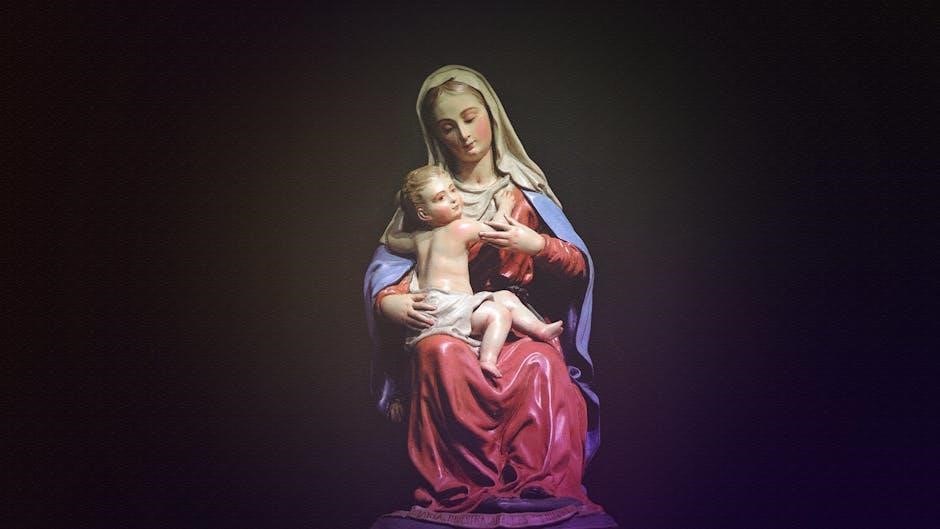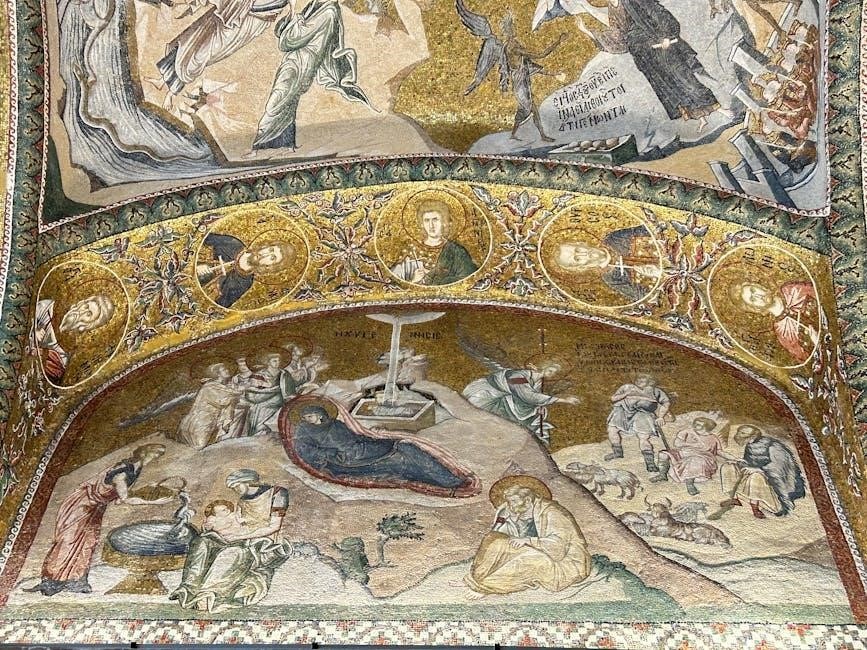Biblical numerology explores the spiritual significance of numbers in Scripture, revealing divine truths and themes. Numbers like 7 symbolize completeness, while others represent unity or judgment, offering deeper insights into biblical narratives and God’s plan.
Understanding biblical numerology requires studying the symbolic meanings of numbers, which often recur in key events and prophecies. PDF resources provide comprehensive guides to interpreting these numbers, aiding readers in uncovering their profound significance.
Definition and Overview
Biblical numerology is the study of the symbolic significance of numbers in Scripture, uncovering divine truths and themes. It examines how numbers like 7, 3, and 12 represent spiritual concepts, such as completeness or divine perfection. This interpretative tool helps deepen understanding of biblical narratives, revealing hidden patterns and meanings embedded in God’s Word. PDF resources offer detailed analyses, making it accessible for modern readers to explore these timeless insights.
Significance of Numbers in the Bible
Numbers in the Bible carry profound spiritual significance, often symbolizing divine truths and themes. For instance, the number 7 represents completeness, while 3 signifies divine completeness and resurrection. These numerical patterns guide readers to deeper insights into God’s plan, emphasizing unity, judgment, and spiritual perfection. Understanding their symbolic meanings unlocks layers of biblical interpretation, revealing the intricate design of Scripture.

The Number 1: Unity and God
The number 1 signifies divine unity and God’s uniqueness, representing His singular nature and the unity of the Trinity, emphasizing His independence and supremacy in creation.
Symbolism of Unity
The number 1 symbolizes unity, representing God’s unique nature and the unity of the Trinity. It signifies absolute singleness and independence, emphasizing God’s sovereignty. This number underscores the oneness of God, reflecting His indivisible essence and the unity of believers in Christ, as expressed in Deuteronomy 6:4, “The LORD our God, the LORD is one.”
References in Scripture (e.g., Deuteronomy 6:4)
Deuteronomy 6:4 declares, “The LORD our God, the LORD is one,” a cornerstone of biblical numerology. This verse underscores the number 1’s symbolism of unity, reflecting God’s singular nature. Similarly, Ephesians 4:6 emphasizes “one God and Father of all,” further solidifying the theme of unity in Scripture, highlighting the profound spiritual significance of the number 1 in expressing divine oneness and harmony.

The Number 2: Union, Division, Witnessing
The number 2 symbolizes duality, union, and division in Scripture. It represents the unity of God and humanity, as seen in Genesis 1:26-27, where God creates mankind in His image, male and female, symbolizing partnership and the divine-human connection.
Jesus, as the Second Person of the Trinity, embodies the number 2, reflecting divine truth and redemption. His resurrection on the third day and appearances to two witnesses underscore its significance in testimony and verification throughout Scripture.
Duality and Testimony in the Bible
The number 2 reflects duality, symbolizing union and division, and serves as a witness to divine truth. It represents the balance between heavenly and earthly realms, as seen in the two great lights in Genesis 1:16. Duality is also evident in the two tablets of the Ten Commandments and the two witnesses in Revelation 11, emphasizing testimony and verification of God’s plan.
This number underscores the necessity of agreement and confirmation, highlighting its role in establishing truth and covenant in Scripture.
Jesus as the Second Person of the Trinity
The number 2 is deeply connected to Jesus, the second person of the Trinity, symbolizing divine union and duality. As the Son of God, He embodies both divine and human natures, reflecting the unity of Godhead. His role as the second Adam and His resurrection on the third day further emphasize His significance in redemption and the fulfillment of God’s plan. Through Him, humanity finds unity with God, illustrating the profound meaning of duality in salvation history.
- Jesus’ dual nature (divine and human) symbolizes the unity of the Godhead.
- His role as the second Adam underscores redemption and new life.
- The resurrection on the third day highlights divine completeness and victory over sin.
Jesus’ position as the second person of the Trinity reflects both unity and duality, central to biblical numerology and Christian theology.
The Number 3: Divine Completeness and Perfection
The number 3 symbolizes divine completeness, perfection, and the Trinity. It is associated with significant events like Jesus’ resurrection on the third day, emphasizing God’s plan and ultimate victory over sin.
The Trinity and Resurrection
The number three is deeply tied to the Trinity, representing God the Father, Jesus Christ, and the Holy Spirit. It also symbolizes resurrection, as Jesus rose on the third day, fulfilling divine perfection and completing humanity’s redemption. This number underscores the unity and completeness of God’s plan, reflecting His sovereign will and the ultimate triumph over sin and death.
Examples from Scripture (e.g., Three Days of Jonah)
The number three is prominent in Scripture, symbolizing divine completeness. Jonah spent three days in the belly of the great fish, prefiguring Jesus’s resurrection. Similarly, Jesus rose on the third day, fulfilling the prophecy of divine redemption. These examples highlight the symbolic use of three to represent resurrection, restoration, and the fulfillment of God’s plan in human history.
The Number 4: Creation and Earth
The number four symbolizes creation and the physical world, as seen in the fourth day of creation, when God established the sun, moon, and stars to govern the earth.
Material Creation and the Fourth Day
The fourth day of creation marks the establishment of the material world, as God created the sun, moon, and stars to govern the earth. These celestial bodies signify order and divine purpose, reflecting God’s mastery over the physical realm. The number four is deeply connected to the earth and its creation, symbolizing stability and the tangible aspects of God’s handiwork.
- The sun and moon were created to separate day from night.
- They serve as signs and seasons, marking time and divine order.
- The fourth day underscores God’s attention to the physical world’s structure.
Human Weakness and the Earthly Realm
The number 4 in biblical numerology symbolizes human weakness and the earthly realm. It reflects the limitations and frailties of mankind, emphasizing the physical and temporal aspects of human existence. This number also highlights the earth as a place of testing and growth, where divine lessons are learned through earthly experiences and challenges.
- The earth represents a realm of human struggle and moral choice.
- It underscores the transient nature of physical life and the need for spiritual focus.
- Four reminds us of our dependence on God amidst earthly frailties.
The Number 7: Spiritual Perfection
The number 7 signifies spiritual perfection and completeness in the Bible, as seen in the seven days of creation. It symbolizes rest, divine fulfillment, and sacred completion.
Seven Days of Creation
The seven days of creation, as described in Genesis, embody the perfection of God’s plan. The seventh day, a day of rest, symbolizes spiritual completion and divine sanctification. Biblical numerology highlights this pattern, reflecting the harmony and order of God’s creation. This structure underscores the significance of seven as a number representing fulfillment and the culmination of divine work.
Completion and Rest in Scripture
The number seven signifies completion and rest in Scripture, as seen in the seventh day of creation when God rested. This theme recurs in the New Testament, where Jesus offers rest to believers. The Sabbath, observed on the seventh day, further emphasizes divine rest. Biblical numerology highlights how seven embodies spiritual fulfillment and the culmination of God’s divine plan, reflecting His perfect order and harmony.
The Number 6: Mankind and Sin
The number six represents mankind and sin, symbolizing human imperfection and frailty. It is associated with the sixth day of creation when God made humanity and the number 666, signifying evil and rebellion against God.
Creation of Man on the Sixth Day
The sixth day of creation marks the culmination of God’s work, as mankind was formed in His image. This day signifies humanity’s unique place in creation, yet also points to human weakness and the earthly realm. The number six symbolizes the completion of physical creation, setting the stage for rest on the seventh day, while also hinting at mankind’s potential for sin and rebellion, later mirrored in the number 666, the mark of the beast.
666 as the Number of the Beast
The number 666, known as the “number of the beast,” symbolizes imperfection, humanity’s rebellion, and opposition to God. In Revelation, it represents the Antichrist, embodying evil and separation from divine order. This number is deeply tied to the end times and serves as a warning against sin and allegiance to worldly powers, highlighting mankind’s fallen nature and the consequences of rejecting God’s sovereignty.

The Number 8: New Beginnings
The number 8 signifies new beginnings, symbolizing resurrection and renewal. Circumcision on the eighth day marks a fresh start, reflecting new creation and spiritual rebirth in Christ.
Circumcision on the Eighth Day
Circumcision on the eighth day symbolizes new beginnings and covenant obedience. It marks a child’s dedication to God, reflecting divine renewal and spiritual purification. This practice, rooted in Abraham’s covenant, signifies separation from the flesh and entry into God’s people, embodying resurrection and new creation through obedience to divine commandments.
New Creation and Resurrection
The number eight symbolizes new beginnings and resurrection, representing a fresh start and spiritual renewal. Christ’s resurrection on the eighth day underscores this theme, marking the triumph over death and the dawn of new creation. This concept is deeply rooted in biblical numerology, signifying a transformation from the old to the new, reflecting God’s redemptive plan and the believer’s rebirth in Christ.
The Number 9: Divine Completeness and Fruit of the Spirit
The number nine represents divine completeness and the Fruit of the Spirit, embodying spiritual maturity and God’s abundant grace in believers’ lives through nine key virtues.
Nine Fruits of the Spirit
The number nine is closely tied to the nine Fruit of the Spirit: love, joy, peace, patience, kindness, goodness, faithfulness, gentleness, and self-control. These virtues, listed in Galatians 5:22-23, represent the spiritual maturity and divine character believers strive to embody. The number nine symbolizes completeness in spiritual growth, reflecting God’s abundant grace and the transformative work of the Holy Spirit in believers’ lives through these nine key attributes.
Divine Manifestation in Scripture
The number nine signifies divine completeness and is linked to the Fruit of the Spirit, which are nine in total. These fruits—love, joy, peace, patience, kindness, goodness, faithfulness, gentleness, and self-control—reflect the character of God and His transformative work in believers. Together, they represent the Holy Spirit’s complete and perfect work in the lives of those who follow Christ, embodying divine manifestation, grace, and spiritual fullness.

The Number 10: Testing and Commandments
The number 10 symbolizes divine order, testing, and God’s commandments. It is notably associated with the Ten Commandments and the Israelites’ 40 years of trials in the wilderness.
The Ten Commandments
The Ten Commandments, found in Exodus 20, are a cornerstone of biblical law, reflecting divine order and moral guidance. They represent God’s covenant with Israel, establishing principles for righteous living. The number 10 here signifies completeness and authority, emphasizing the importance of obedience to these foundational teachings in achieving spiritual harmony and fellowship with God.
Testing and Trials in the Wilderness
The number 10 symbolizes testing and trials, as seen in Israel’s wilderness journey. This period of wandering, though 40 years in duration, represented a divine test of faith and obedience. The wilderness experience purified their faith, revealing God’s provision and judgment. It underscored the importance of trust and perseverance, aligning with the spiritual significance of the number 10 in biblical numerology.
The Number 12: Governmental Perfection
The number 12 signifies divine governance and order, as seen in the Twelve Tribes of Israel and the Twelve Apostles, symbolizing God’s perfect governmental structure on earth.
Twelve Tribes of Israel
The Twelve Tribes of Israel, representing completeness and divine governance, were chosen by God to establish His covenant people. Each tribe symbolized a distinct aspect of God’s plan, with their unity reflecting His perfect order. This structure, rooted in biblical numerology, underscores the significance of the number 12 in governance and spiritual organization, as detailed in PDF resources on the topic.
Twelve Apostles and the New Jerusalem
The Twelve Apostles, chosen by Jesus, signify spiritual governance and completeness. Their number reflects divine order, mirroring the Twelve Tribes. In Revelation, the New Jerusalem, with twelve gates and foundations, embodies the perfected kingdom, where these apostles are honored, symbolizing eternal fellowship and God’s ultimate plan for humanity, as explored in-depth in biblical numerology PDFs.
